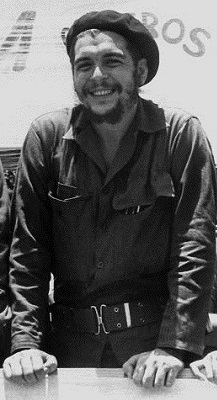|
~ Ernesto Che Guevara
~ Galéria
~ Oldal
~ Bejelentkezés
~ Vissza a Főoldalra
Ernesto Che Guevara, az argentin származású forradalmár, miniszter, gerillavezér és író, Buenos Aires-ben szerzett orvosi diplomát, majd a kubai forradalom során jelentős szerepet játszott a szigetország felszabadításában és újjáépítésében. A kubai gazdaság talpraállításáért dolgozott, küzdött az oktatás és az egészségügy fejlesztéséért, az írástudatlanság és a faji előítéletek felszámolásáért. Saját példájával népszerűsítette az önkéntes munkát. Kongóban és Bolíviában is harcolt - harminckilenc éves volt, amikor az amerikai-bolíviai csapatok csapdába ejtették és kivégezték.
| | |
|

| | |
|
|
Articles about Che Guevara |
|
Club Che Guevara
2013.12.25. 10:02
The Club Che Guevara was founded seven years ago in Córdoba and it contains 130 young boys from a poor background, whose favourite pastime is playing football. This was "used" by the founders of the club in order to help and encourage these young people who could have chosen a bad way of life, but in the club they can play football, they can learn the advantage of studying and hard work. They can also get to know Che Guevara's ideas and works.
The recent president of the club (re-elected for the third time) Mónica Nielsen and the parents work hard for the dream of the children: for their own stadium.
There is no entrance fee. The only source of money comes from the sales of the blue football T-shirts, with Che's portrait on it (it costs 180 pesos) - the children play in such T-shirts during their training and their matches.
Source | Photos
| | |
|
|
|
~ Ernesto Che Guevara
~ Gallery
~ Site
~ Log in
~ Back to the Main page
Ernesto Che Guevara, the Argentine-born revolutionary, minister, guerrilla leader and writer, received his medical degree in Buenos Aires, then played an essential part in the Cuban Revolution in liberating and rebuilding the country. He did his best to set up the Cuban economy, fought for the improvement of the education and the health system, the elimination of illiteracy and racial prejudice. He promoted voluntary work by his own example. He fought in the Congo and in Bolivia - he was thirty-nine years old, when he was trapped and executed by the joint American-Bolivian forces.
| | |
|
|

